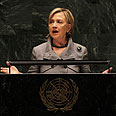
Clinton at NPT conference
צילום: AFP
US says nuclear arsenal includes 5,113 warheads
Pentagon reveals for first time size of American nuclear arsenal, which it claims has been reduced by 84% since 1967. Clinton tells NPT conference Iran's nuclear ambitions put world at risk, says US will back 'practical measures' to establish nuclear-free Mideast
The United States disclosed for the first time on Monday the overall size of its nuclear arsenal, saying it had a total of 5,113 warheads operationally deployed, kept in active reserve and held in inactive storage.
The total does not include warheads that have been retired and scheduled for dismantlement, an estimated 4,600 according to the Federation of American Scientists nonprofit group.
According to figures released by the Pentagon, the US nuclear arsenal has been reduced by 84% from its maximum level of 31,225 warheads at the end of fiscal year 1967.
US Secretary of State Hillary Clinton on Monday said that Iran's nuclear ambitions put the world at risk and called on global nations to rally around US efforts to hold Tehran to account.
"Iran is the only country represented in this hall that has been found by the IAEA board of governors to be currently in non-compliance with its nuclear safeguard obligations," Clinton said in a speech to a Nuclear Non-proliferation Treaty (NPT) review conference at the United Nations.
"It has defied the UN Security Council and the IAEA and placed the future of the non-proliferation regime in jeopardy, and that is why it is facing increasing isolation and pressure from the international community," she said.
Clinton spoke to the meeting of the 189 signatories of the 1970 NPT just hours after Iran's President Mahmoud Ahmadinejad, who used his speech to slam the United States for what he said were threats to use nuclear weapons on his country.
Clinton dismissed Ahmadinejad's comments as the "same tired, false and sometimes wild accusations" that the world had heard before, and urged nations to focus on efforts to bring Iran to heel.
"Iran will not succeed in its efforts to divert and divide. The United States and the great majority of the nations represented here come to this conference with a much larger agenda," Clinton said.
"Now is the time to build consensus, not to block it."
Clinton detailed what she described as the strong US record on nuclear non-proliferation and weapons control, including the recently concluded US-Russia deal to cap strategic nuclear weapons and the new US nuclear policy which sets new limits when and where atomic weapons might be used.
She said Washington would contribute $50 million to a drive to raise $100 million to support the International Atomic Energy Agency (IAEA), the U.N. nuclear watchdog, to promote peaceful uses of nuclear energy in developing countries.
She also said the United States would ratify nuclear weapons-free zones in Africa and the South Pacific and also support "practical measures" to establish the Middle East as a region free of weapons of mass destruction -- which could pique US ally Israel, presumed to have a sizable nuclear arsenal.
Clinton later told reporters that conditions for such a zone in the Middle East did not yet exist.
Clinton said the world stood at a crossroads, facing a future either of sharply reduced nuclear risk or of a spread of nuclear-armed states and groups, and that issues such as Iran's nuclear program could determine which path is taken.
"Rules must be binding. Violations must be punished. Words must mean something and the world must stand together to prevent the spread of these weapons," Clinton said. "It is time for a strong international response."










